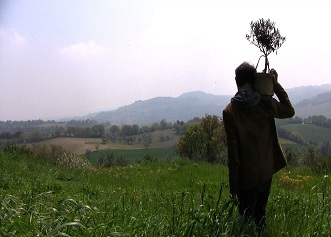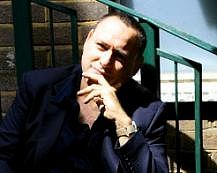An Interesting Exchange With A Jewish Anti-Zionist

The Fairy tale: Settling in "The Promised Land". Aliyah.
The reality: Click on image to find out. Warning: it might
upset you to do so. More reality here, here, here and here.
"I have striven not to laugh at human actions, not to weep at them, nor to hate them, but to understand them." ~ Baruch Spinoza
Daniel Cohen (fictitious name) is deeply admired by many. He is a humanist, an anti Zionist and he is also a man of great integrity. A week ago, Daniel decided to challenge my views, and launched a courageous debate. Being a gracious man he might have hoped to open my eyes to some ‘categorical mistakes’ he believed I was making. For my part, I was very open to his criticism and engaged in the dialogue.
Daniel was not happy with the way the exchange has evolved. Though he circulated his comments and my interventions to his close Jewish friends, he made it clear that he wanted to stop the exchange at a certain stage. Daniel was very angry with me. He also made it clear that he did not want me to publish the exchange of views. As I always do in such cases, I suggested that together, we should edit the debate, but he refused. Respecting Daniel’s request for anonymity, I have now re-edited the text myself, concealing Daniel’s real name, removing all sections and biographical references that could reveal Daniel’s identity. Occasionally, I have re-phrased Daniel’s comments for purpose of continuity and clarity, but I have faithfully retained his meaning.[*]
Unlike Daniel, I believe that issues to do with Jewish history and Jewish ideology must be discussed openly and without fear.
Questions You Should Never Raise
Daniel Cohen: Dear Gilad, we certainly share many ideas and thoughts. We both oppose Zionism and Israeli policies, however, rather, too often, you fail to be careful enough with your formulations, and this gives room for some misunderstandings. You seem to challenge some issues to do with the Holocaust, and history in general. It seems to me as if, often enough, you raise questions to which various sufficient answers already exist.
Gilad Atzmon: I can already tell you, at this stage, that I have a slight problem with your approach. To start with, as a philosopher, I am far more interested in the art of asking questions. I leave the ‘answers’ to politicians. Moreover, the relationship between questions and answers is paradigmatically oriented. A sufficient ‘answer’ within one paradigm (or discourse) may as well be totally inadequate or irrelevant within another -a certain ‘answer’ within Aristotelian physics may well be within the realm of the inexpressible within a ‘Newtonian’ paradigm.
Daniel: If you ask, for instance, why were the Jews repeatedly hated in so many places along their history, as you do in some of your texts, you create room for anti-Semites who may say it is because they are intrinsically evil.
Gilad: To start with, as a thinking being full of curiosity, I do not take instructions from anti Semites or Zionists or Jewish anti Zionist campaigners. I instead follow my instincts and go along with my sincere ethically driven truth-seeking adventure. Also, I believe that the answer you attributed to anti Semites can be easily addressed. Jews cannot be ‘intrinsically evil’ because Jews do not form a racial or ethnic continuum. Any racial attribution to Jews is clearly wrong and silly.
Daniel: I actually do not agree with your approach. The appropriate answer to the above question is that in the Middle Ages Jews were barred from many professions except money trade and peddling, two professions which could easily arouse disdain and hate.
Gilad: Dear Daniel, with all due respect, such an answer is far from being sufficient. In Europe at least, Jews have been emancipated since the French Revolution. By the end of the 19th century most European Jews enjoyed equal rights. And yet, something went horribly wrong in the 1920s-30’s. Our duty then, is to understand, what was it? Why did it happen? Why do Jews encounter resentment all too often and in many different places?
I don’t know whether you are aware of it, but the reasoning you suggest here is very similar to the Early Zionist mantra. Borchov, and Katznelson were also convinced that Diaspora conditions were responsible for ‘Jewish deformed cultural identity’. They believed that on a land of their own, Jews would be able to re-invent themselves and become ‘people like other peoples’.
As you and I agree, Zionism is a complete disaster. The Jews are hated in the Middle East. And as Shahid Alam suggests, Zionism did not really solve the Jewish question; it only re-located it in a new place (Zion).
The answer to the question is actually very simple; as long as Jews operate politically, culturally and socially within exclusive racially oriented cells, be it Israel, Zionism, Jewish ‘anti’ Zionist networks or even ‘Jews only’ football clubs , they will encounter problems.
But let us go back to issues of whether some ‘questions that should never be raised’. For me, to be in the world is to live through changes, to allow meaning to be in flux and to let ourselves be transformed accordingly. I could never accept the Idea that some questions have sufficient and firm answers. In fact, I oppose any form of dogmatism.
Daniel: But, in your text ‘Truth, History & Integrity’ you go as far as asking “why Auschwitz’s (Jewish) prisoners didn’t wait for the Red Army ?” Do you think that this is an appropriate question to ask?
Gilad: Sorry Daniel. I have to stop you there, I believe that in order to address this quote, I must first re-locate my words in the right order, and within the appropriate context. In my paper ‘Truth, History & Integrity’[1] I quote Israeli Holocaust historian Israel Gutman, who suggests that Auschwitz prisoners (or at least some of them) joined the Death March voluntarily (“I then decided to join [the march] with all the other inmates and to share their fate” )[2]. Following Gutman’s quote, I then presented the following inference:
“If the Nazis ran a death factory in Auschwitz-Birkenau, why would the Jewish prisoners join them at the end of the war? Why didn’t the Jews wait for their Red liberators?”
What we see above is a clear inference (rather than a mere question). It seems to me that it is there to suggest that further research is needed. As opposed to the historian who searches for a narrative, as a philosopher, I am there to question what the word ‘narrative’ actually stands for, or in Kantian terms -- what are the conditions of the possibility of a historical narrative. In my relevant paper, I do not attempt to provide an answer -- I am not an historian. My primary issue is concerned with the freedom to wander/wonder, and to raise possible dilemmas without being terrorised by the ‘Holocaust censorship police’ or any other form of thought dictatorship.
Daniel: But, can’t you see that with such a manner of behaviour you provide Holocaust deniers and anti-Semites with ammunition? They can so easily misuse your words.
Gilad: Dear Daniel, I do understand your concern, but with all due respect, I have been writing for some years now, and, as far as I am aware, anti-Semites or Holocaust deniers do not seem to misuse my words. I have been quoted by some so-called anti Semites, some of whom liked me, whilst others hated me, but they appear to quote my ideas within context and seem to be faithful to the original meaning and intention of my writing.
But -- let me tell you, I have seen many Zionists and ‘anti’ Zionists systematically misquoting me, misrepresenting me, forging my statements, and taking my words out of context, all willfully done to create the most awful impression of my work.
Daniel: But let’s return to your earlier statement -- can’t you see that the inference you are making here is that Auschwitz was not a death factory, which to me, comes near to denial.
Gilad: No, I do not agree with such an interpretation of my words. In my article, you will notice that I refrain from suggesting any answer. I would argue instead that raising the right questions is far more important than repeating the ‘right’ answers. The same applies to the 911 Truth Movement. Whether someone manages to come up with the right explanation of this peculiar chain of events is one issue, the fact that so many people suspect and challenge the official narrative is clearly a revelation or at least very positive sign. Furthermore, I also find the notion of ‘denial’ rather problematic. Instead of denial, I would prefer to emphasise the fundamental and ethically grounded right to revise, re-visit and re-view. I believe that to be tolerant is to agree not to agree, and also to respect others when we don’t agree.
Jews, Judaism & Jewishness
Daniel: I want to say that I am also troubled with your attitude towards Judaism and Jewish religion.
|
If you are interested in freedom of speech | iv>Gilad: Actually, you will notice when you read my work that I tend to avoid dealing with the Judaism (the religion), and I also avoid discussing Jewish people as an ethnic or racial group -- instead, I prefer to elaborate on ‘Jewishness’, Jewish ideology and Jewish political identity.


























